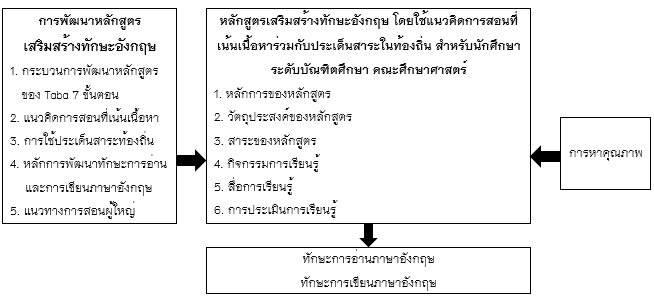Curriculum Development for English Reading and Writing Skills Enhancement Using Content-Based Instruction Approach with Local Issues for Graduate Students in Faculty of Education
Main Article Content
Abstract
This research aimed to develop and study the results of implementing the English reading and writing skills curriculum enhancement using Content-based Instruction with local issues for graduate students in Faculty of Education. The sample groups consisted of 1) five experts who were chosen by purposive sampling for evaluating curriculum quality, and 2) 13 Master's students in the field of Curriculum, Teaching, and Learning Technology who voluntarily participated in the study. The research instruments included curriculum quality evaluation form, English reading skill tests, and English writing skill tests. The data were statistically analyzed for mean, percentage, and standard deviation.
It was found that 1) the English skills curriculum enhancement emphasized reading and writing skills using content-based instruction and local issues for graduate students in Faculty of Education consisted of six elements: curriculum principles, curriculum objectives, curriculum strand, learning activities, learning media, and learning evaluation. The overall quality of curriculum was at a high level, and 2) After the implementation of the lessons, the graduate students had overall average scores of English reading skill at 73.16 percent and English writing skill at 63.03 percent, passing the 60 percentage criteria.
Downloads
Article Details

This work is licensed under a Creative Commons Attribution-NonCommercial-NoDerivatives 4.0 International License.
References
กัญญารัตน์ เครือรัตนไพบูลย์ และอังคณา อ่อนธานี. (2561). การพัฒนาหลักสูตรฝึกอบรมเพื่อเสริมสร้างความสามารถในการสื่อสารภาษาอังกฤษ โดยใช้กลวิธีพหุประสาทสัมผัส สำหรับพนักงานโรงแรม. วารสารศึกษาศาสตร์ มหาวิทยาลัยนเรศวร, 20(4), 1-12.
กานต์ยุภา ชุ่มสนิท, ปริญญา ทองสอน และฉลอง ทับศรี. (2564). การพัฒนาหลักสูตรค่ายภาษาอังกฤษสำหรับครูภาษาอังกฤษระดับชั้นประถมศึกษา. วารสารมหาจุฬาวิชาการ, 8(1), 206-218.
กิตติยา เกิดปลั่ง. (2563). การพัฒนาหลักสูตรภาษาอังกฤษเพื่อการสื่อสารโดยการเรียนการสอนภาษาที่เน้นเนื้อหาสำหรับผู้เรียนวัยผู้ใหญ่ จังหวัดนนทบุรี ประเทศไทย. วารสารวิชาการเครือข่ายบัณฑิตศึกษามหาวิทยาลัยราชภัฏภาคเหนือ, 10(2), 17-30.
กีรติกา มาฆะสุข. (2562). การศึกษาความสามารถทางการอ่านภาษาอังกฤษและผลสัมฤทธิ์ทางการเรียนวิชาสังคมศึกษาด้วยการสอนภาษาที่เน้นเนื้อหาของนักเรียนชั้นประถมศึกษาปีที่ 5 หลักสูตร English Program. วารสารมหาวิทยาลัยราชภัฏยะลา, 14(3), 389-398.
คณะศึกษาศาสตร์ มหาวิทยาลัยเชียงใหม่. (2562). รายงานประจำปีการศึกษา 2561 ของคณะศึกษาศาสตร์ มหาวิทยาลัยเชียงใหม่. สืบค้นจาก https://www.edu.cmu.ac.th/page/annual
ณฐมน ชมจันทร์ และจิตณรงค์ เอี่ยมสำอางค์. (2564). การพัฒนาการจัดการเรียนรู้บูรณาการท้องถิ่นที่เน้นภาระงาน เพื่อเสริมสร้างความสามารถในการสื่อสารภาษาอังกฤษ สำหรับนักเรียนชั้นมัธยมศึกษาปีที่ 3. วารสารสหวิทยาการมนุษยศาสตร์และสังคมศาสตร์, 4(2), 536-549.
ดวงจันทร์ แก้วกงพาน, จันทร์จิรา ไพบูลย์นําทรัพย์, รุ่งไพลิน ฤทธิ์พนา และชิสาพัชร์ ชูทอง. (2562). การออกแบบการจัดการเรียนการสอนโดยใช้ภูมิปัญญาท้องถิ่น ของนักเรียนชั้นมัธยมศึกษาปีที่ 1 อําเภอเกาะคา จังหวัดลําปาง. วารสารวิชาการ Veridian E–Journal, Silpakorn University ฉบับภาษาไทย สาขามนุษย ศาสตร์ สังคมศาสตร์ และศิลปะ, 12(3), 397-414.
ธิดากุล บุญรักษา และพรพรรณ โพธิสุวรรณ. (2564). การพัฒนาหลักสูตรฝึกอบรมยุวชนมัคคุเทศก์ท้องถิ่นที่ส่งเสริมการท่องเที่ยว วิถีชุมชนบ้านคลองคาง จังหวัดนครสวรรค์. วารสารวิชาการเครือข่ายบัณฑิตศึกษามหาวิทยาลัยราชภัฏภาคเหนือ, 11(1), 69-84.
บัณฑิตวิทยาลัย มหาวิทยาลัยเชียงใหม่. (2564). เงื่อนไขภาษาต่างประเทศสำหรับนักศึกษาระดับบัณฑิตศึกษา. สืบค้นจาก https://www.grad.cmu.ac.th/grad_wp2/wp-content/uploads/2021/06/Announce-Foreign-64.pdf
รัตนะ บัวสนธ์. (2562). การวิจัยและพัฒนานวัตกรรมทางการศึกษา. กรุงเทพฯ: สำนักพิมพ์จุฬาลงกรณ์มหาวิทยาลัย.
วารีรัตน์ แก้วอุไร. (2564). การพัฒนาหลักสูตร: จากทฤษฎีสู่การปฏิบัติ. พิษณุโลก: สำนักพิมพ์มหาวิทยาลัยนเรศวร.
วิไลรัตน์ คีรินทร์. (2561). การพัฒนาบทเรียนท้องถิ่นภาษาอังกฤษโดยการบูรณาการกับรายวิชา วิธีสอนและวิธีวิจัยของนักศึกษาเอกภาษาอังกฤษ. วารสารมนุษยศาสตร์ มหาวิทยาลัยนเรศวร, 15(1), 13-25.
ศิริวรรณ วณิชวัฒนวรชัย และชลธิชา หอมฟุ้ง. (2561). การบูรณาการเชิงสร้างสรรค์ภูมิปัญญาท้องถิ่นสู่การจัดการเรียนการสอนในศตวรรษที่ 21. วารสารวิชาการ Veridian E–Journal, Silpakorn University ฉบับภาษาไทย สาขามนุษยศาสตร์ สังคมศาสตร์ และศิลปะ, 11(3), 2551-2563.
สมเกียรติ อินทสิงห์. (2562). การพัฒนาหลักสูตรการคิดเพื่อการเรียนรู้ในศตวรรษที่ 21 ในหมวดศึกษาทั่วไปที่เน้นการเรียนรู้เชิงรุกสำหรับนักศึกษาปริญญาตรี มหาวิทยาลัยเชียงใหม่. วารสารศึกษาศาสตร์ มหาวิทยาลัยขอนแก่น, 42(3), 37-53.
สมเกียรติ อินทสิงห์. (2563). การบริหารหลักสูตรสถานศึกษา. เชียงใหม่: หน่วยพิมพ์เอกสารคณะวิทยาศาสตร์ มหาวิทยาลัยเชียงใหม่.
ศรายุทธ สุภะโส และมนตรี วงษ์สะพาน. (2562). การพัฒนาหลักสูตรพัฒนาครูในการจัดกิจกรรมการเรียนรู้ภาษาอังกฤษเพื่อการสื่อสาร โดยใช้ชุมชนการเรียนรู้ทางวิชาชีพ. วารสารวิชาการธรรมทรรศน์, 19(2), 35-47.
Chutima, S., Intasingh, S., & Nguenguang, S. (2020). The study of graduate students’ needs in developing English reading and writing skills. Proceedings of the 10th Payap University Research Symposium 2020, 14 February 2020 at Payap University, pp. 218-226. Retrieved from https://symposiumpyu.payap.ac.th/home/?load=content&lang=th&id=0000000055
Herrell, A., & Jordan, M. (2020). 50 Strategies for teaching English language learners. (6th ed.). New Jersey: Pearson Education, Inc.
Hull, T. (2018). Content-based instruction: A communicative approach for the EFL classroom. Pupil: International Journal of Teaching, Education and Learning, 2(3), 63-77.
Kaewpradit, P., Kaewkong, P., & Sinprajakpol, S. (2018). Using content-based instruction to improve students’ English writing. Al-Nur Journal of Graduate School of Fatoni University, 13(24), 79-93.
Khusniyah, N., & Wadi, A. (2020). Investigating content-based reading instruction in promoting students’ reading comprehension: A classroom action research. Research and Innovation in Language Learning, 3(2), 96-106. Retrieved from https://pdfs.semanticscholar.org/f091/c83617be95b5dba6a4f78cdbe8fa8b38daa0.pdf?_ga=2.152624889.1715589570.1648650208-2013753510.1648650208
Krulatz, A. (2019). Content-based instruction in teacher education: Reshaping pre-service teachers’ beliefs about language teaching. English Language Teacher Education and Development, 22(2019), 9-16.
Kunlasuth, K., Chaovanapricha, K., Wutthisivachardkul, J., & Owatnupat, N. (2019). A quality development of Thai youth for the future society through English camp process. Journal of MCU Peace Studies, 7(4), 951-967.
Mantilla, M. & Andrade, C. (2020). Content-based instruction strategies to Improve English major students´L2 writing skills command. Ecos De La Academia, 6(11), 33-49. Retrieved from https://www.researchgate.net/publication/359146742_Content-based_Instruction_Strategies_to_ Improve_English_Major_Students_L2_Writing_Skills_Command
Spenader, A., Wesely, P., & Glynn, C. (2018). When culture is content: Applications for content-based instruction in the world language classroom. Language Teaching Research, 24(4), 476-495.
Taba, H. (1962). Curriculum development: Theory and practice. New York: Harcourt, Brace and World.
Vanichvasin, P. (2019). Effects of content-based instruction on English language performance of Thai undergraduate students in a non-English program. English Language Teaching, 12(8), 20-29 Retrieved from https://files.eric.ed.gov/fulltext/EJ1221232.pdf


